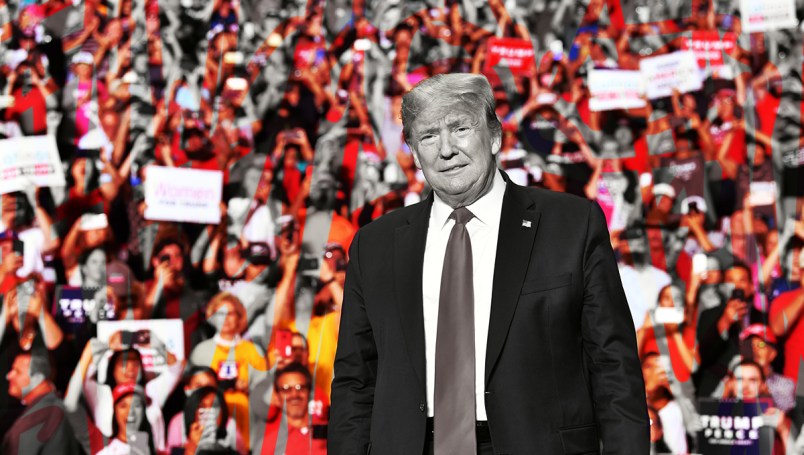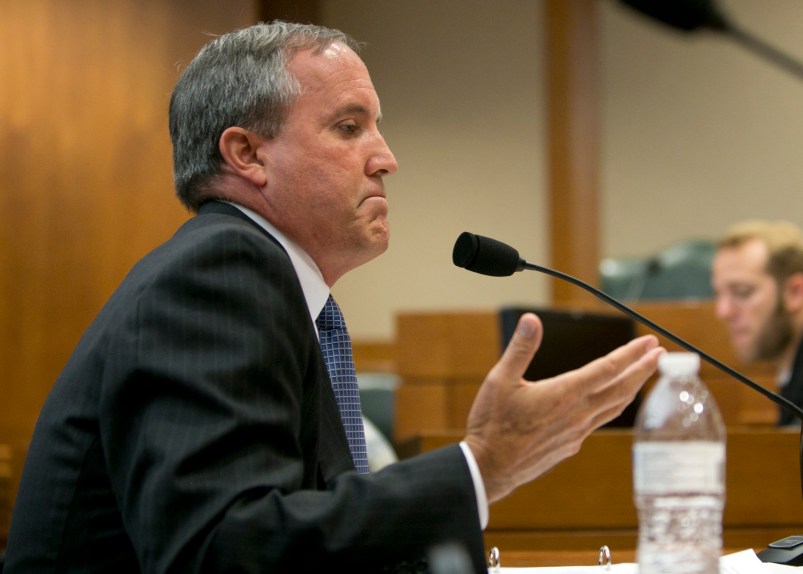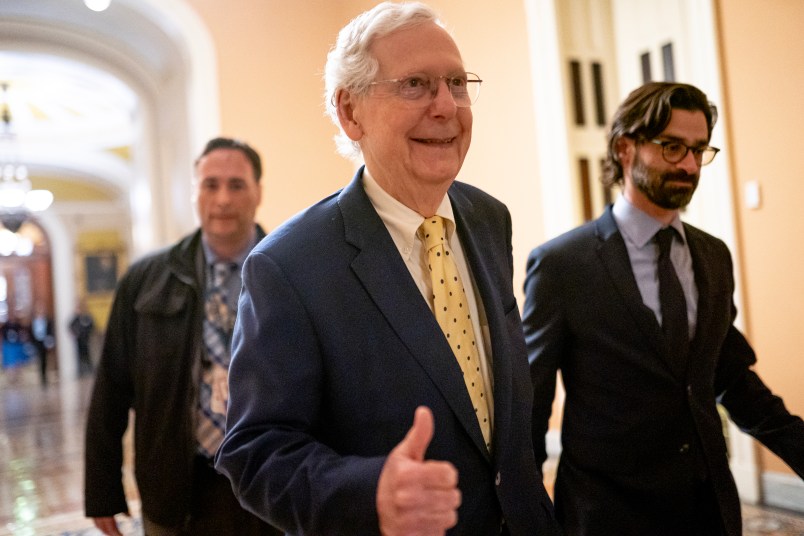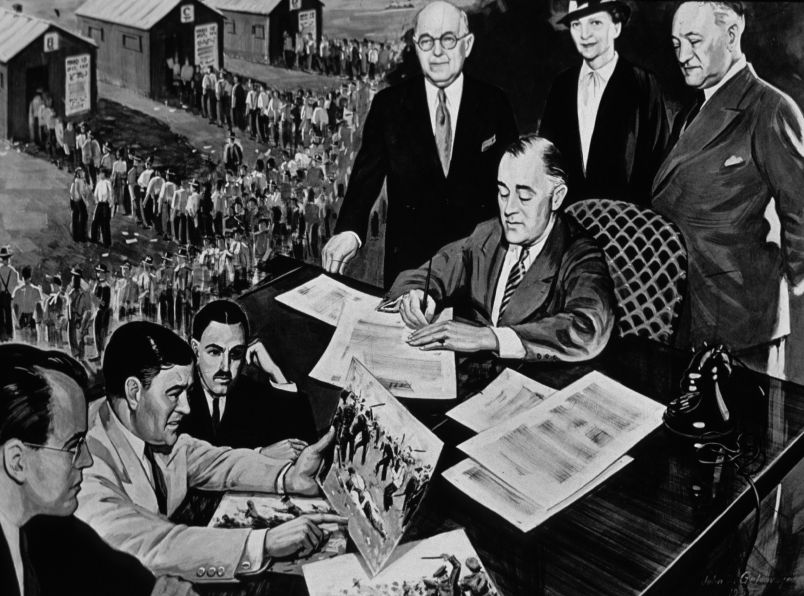This article is part of TPM Cafe, TPM’s home for opinion and news analysis.
Since Donald Trump’s surprise victory in 2016, political observers have sought to understand the elusive Obama-Trump swing voter — Americans who voted for the Democratic candidate in 2012 but who switched party loyalties in 2016 to vote for a candidate who regularly invoked negative stereotypes of racial minorities.
My latest research may shed more light onto this mysterious group of voters.
In a study on racial dog whistles, we found that a surprising group of Americans is particularly susceptible to attempts to sway their opinions through references to racial stereotypes.
Racial dog whistling has long been a tactic of Republican political messaging. However, our research suggests that in the current political environment, these messages appear to be most effective in swaying the political opinions of liberals — specifically white liberals who harbor higher than average levels of racial resentment.
In two experiments I conducted with Robb Willer of Stanford University, we examined the effects of implicit and explicit racial cues on white Americans’ evaluations of welfare programs and gun control policies. We did this by presenting them with political messages that subtly or overtly cued racial stereotypes, and then comparing their political attitudes to those of participants who read a message without any racial content.
We found that subtle racial cues did indeed influence political opinions — but most consistently among white, racially resentful liberals.
What’s even more surprising are the results of the overt racial cues.
A long tradition of research in political behavior suggests that white Americans’ political opinions can be influenced by subtle racial cues, but that these racial “dog whistles” can only influence white peoples’ attitudes if the racial content of the message remains outside of conscious awareness. Once the racial meaning becomes too obvious, the message should backfire, as most will reject it as racist.
Yet we found that the white, racially resentful liberals who responded to the subtle cues also responded most strongly to the overtly racist message, despite the fact that participants overwhelmingly acknowledged that this message was offensive.
We didn’t predict these results, which means they should be subjected to further study. In addition, we can only speculate as to why racially resentful liberals might be more likely than other Americans to respond to this rhetoric. For example, it may be that conservative news sources already discuss issues of poverty and crime in such racially loaded terms that any message we presented to conservative participants essentially echoed arguments with which they were already familiar. That would lead these appeals to have little effect on conservative participants’ opinions, leaving us to see dog-whistle effects only among liberals.
That said, these surprising findings may lend insight into Obama-Trump swing voters.
The results of our experiments suggest that racially resentful, white liberals are most swayed by attempts to tap into latent racial animosities. By analyzing national survey data, we also found that this same group was particularly likely to switch from voting for Barack Obama in 2012 to Donald Trump in 2016. While our research can’t prove that these individuals voted for Trump because his campaign messages invoked negative stereotypes of racial minorities, the pattern is suggestive.
The figure below graphs the results of our statistical analysis predicting how likely a white American is to be an Obama-Trump swing voter by their political ideology and racial attitudes. Among white liberals highest in racial resentment, the probability of being an Obama-Trump swing voter is over 50%.
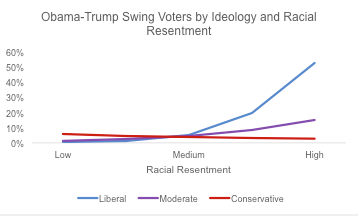
Together, these findings support the idea that Donald Trump’s inflammatory racial rhetoric helped him win support among some white, traditionally Democratic voters, propelling him to the presidency in 2016.
To be clear, our findings do not suggest that liberals are the “real racists” in America, as some spin of these findings might have you believe. While we found that white liberals high in racial resentment are most responsive to this rhetoric, most liberals report relatively low levels of racial resentment. That means that a) most liberals in our studies were not swayed by racial dog whistles, and b) on average, moderates and conservatives in our studies reported higher levels of racial resentment (and other types of racial prejudice) than did liberals.
Instead, one takeaway is that this group of potential swing voters is not comprised of moderates in the traditional sense. Rather, what stands out about these racially resentful, white liberals are their conflicting political attitudes. Their racial attitudes are not aligned with their political ideologies in the same way as most white Americans. As noted above, most liberals in today’s political environment express relatively low levels of racial resentment, and most conservatives express relatively high levels of racial resentment. These racially resentful liberals, on the other hand, have liberal ideologies and typically Democratic partisan identities but are more similar to conservatives in their racial attitudes.
These conflicting attitudes appear to make this group vulnerable to attempts to influence their political opinions with subtle and overt racial appeals, a factor that may have led many of them to vote for Donald Trump.
However, their liberal ideologies and Democratic partisan identities may also mean they can be influenced by principled appeals for traditional liberal priorities, such as an expanded social safety net and government intervention to build a better society. Though this is beyond the scope of our research, this suggests that if Democrats tap into these liberal values and sense of partisan loyalty, these voters may well swing back.
Rachel Wetts is the Acacia Assistant Professor of Environment and Society and Sociology at Brown University. Her research focuses on the politics of white racial resentment, and the problem of stalled political action to address climate change.





